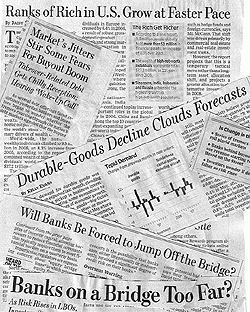Take Thursdays edition. I cut out headlines from stories in just that one edition. Here they are.
When consumers do that it's called "consumer spending," - and no one ever seems to link it to "consumer earning." Because if they did it would expose the fact that, as an economic model fueling an economy on borrowed money isn't sustainable -- it wasn't, isn't and won't be.
There are two kinds of corporate debt, the good kind and the bad kind. The good kind of debt is used to expand operations to meet growing demand. That's called "capital investment." The bad kind is when companies borrow enormous sums of money simply to buy up other existing companies in what called "leveraged buyouts," or LBOs. The leveraged part means they used very little, if any, of their own money borrowing the money instead from always eager commercial bankers.
By now you might be wondering why commercial bankers have been so eager to shell out money to a bmuch of debt-burdened corporate bororwers. Simple, they don't care if the deal makes or breaks the borrowing company, because they -- the bankers -- won't be anywhere around when any possible sh*t hits the fan. First, they collect fat loan fees for financing the deal. Then they carve the loans up into increasingly exotic pieces -- (tranches). They package these bits and pieces up and sell on Wall Street to investors seeking higher yields than they can get from much safer US treasuries.
For example, an investor might want to buy just the interest portion of those loans in what is now a CBO (collateralized bond obligation). Or an investor's needs might cause them to be attracted to the discounted principle tranche.
(Of all these tranches my favorite is the one called a "reverse floater." Don't believe me? Click the link and see for yourself. But there's no way I'd invest my hard-earned money into a investment that sounds like something that refuses to go down when I flush my toilet.)
But I digress.
The bottom line here is that, just as over-extened consumers are cutting back on spending (with borrowed money) those CBO-buying investors are now worried that the leverage buyout boom is running out of steam... or suckers. Even those take-the-money-and-run commercial bankers are getting nervous. After all, many of those tranche-buying investors have gotten stinking rich off the LBO bubble, meaning they have enough money to hire the best lawyers in the world to sue the green eye shades off their bankers for sticking them with bits and pieces of defaulted loans. (I can't wait to see how they're going to put all those Humpty Dumpty loan pieces back together. "Hey, you're standing on my reverse floater." "Am not." "Oh yeah, then what's that on your shoe?" "Ewwwww.")
Meanwhile to gap between the majority of us and the super-rich has grown so wide we can barely see the outlines of the MacMansions on the other side. Believe me, it's not jealousy that fuels my concern over that fact. Since the kids grew up and moved away my wife and I rattle around in our modest ranch-style home like two beans in an otherwise empty rattle. We lust not for anything larger.
No, my concern comes from a visceral feeling that money serves the same purpose in keeping an economy healthy as blood does our body. If too much blood goes to, say the head, leaving too little to bring oxygen to, say the legs, someone going to end up in a wheel chair, or worse.
Oh sure, I'm having a bit of fun with all this because I'm a pretty boring investor. Hell, one look at my asset mix and you'd think my middle name was Lenin. Risk-wise I'm downright unAmerican. I have no credit card debt, no auto or home loan debt and my investments are comprised entirely of things with names than any 19th century accountant would recognize at first glance.
Which, after reading my Wall Street Journal these days, allows me to sleep like a log at night. I don't like giving investment advice because I am wrong at least half the time. (I told all my friends to sell Apple stock back in 1998 because -- I prognosticated -- the company had no future.)
Still, if my assets were heavily weighted in stocks right now, I would begin slowly backing towards the exit with the goal of being out by no later than this October. Who knows, I might be right this time. (Hey, even a broken clock is right twice a day.)
Safety Sadie Says:
Shopping at Wal*Mart May be Harmful to Your Health (or Life)
Wal-Mart made it's trillion-dollar bones by buying cheap stuff from China and selling it cheap in their stores.
Most (70%) of Wal-Mart's Products Are Produced in China
WAL-MART'S INVENTORY OF STOCK PRODUCED IN CHINA TO REACH $18 BILLION
JIANG JINGLING, CHINA BUSINESS WEEKLY






